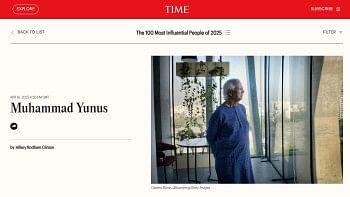Bangladesh at a crossroads: Faith, identity, and change

Religion has long been the bedrock of Bangladesh, binding belief and belonging into the fabric of its identity. Mosques, temples, and churches stand as pillars of piety, steadfast through generations, their very presence a testament to a spiritual identity that has endured the trials of war, the grip of colonisation, and the relentless march of globalisation, standing unshaken in the sands of time. Yet, in hushed conversations among many, a quiet detachment is taking root.
A study, submitted to an international symposium in 2021, on generational and religious norms among Bangladeshi youth found that 68.5 percent of young Bangladeshis now identify more with their national or global identity than with their religion. Some young people participate in religious rituals not out of conviction but to maintain social harmony. A study regarding religious performance during the pandemic highlights that many irreligious students feel compelled to uphold an outwardly religious image despite privately distancing themselves from faith. The study was published on a student-run digital platform.
This shift in perspective is not occurring in a vacuum. It is part of a broader zeitgeist, shaped by the currents of Western liberalism, the rise of individualism, and a culture that champions autonomy over communal identity. Another study from 2021 on education leadership in Bangladesh notes that globalisation, social media, and Western academic structures have reinforced an increasingly corporatised approach to education, one that sidesteps spirituality in favour of material progress.
Individualism, when left unchecked, fosters a culture of detachment, eroding the sense of duty to faith, family, and community. It elevates the self above all else, severing the bonds of responsibility that sustain a cohesive society. The push for autonomy without moral grounding has not led to freedom but to fragmentation, turning self-interest into an ideology that rejects shared purpose. It replaces timeless moral principles with transient ideologies dictated by global trends, creating a feedback loop that feeds its own excesses. Bangladesh, once physically colonised, now navigates a more subtle force: "neo-colonisation," where external influences shape societal values and perceptions under the banner of progress—often unchallenged, often unquestioned.
What is striking, however, is not just the slow detachment from religious practice, but the reason for it. It is not entirely an intellectual rebellion, nor a conscious rejection of faith. It is, in many cases, the result of blind belief itself. Faith, when inherited but not explained, when memorised but not internalised, becomes fragile. When young people are handed religion as an obligation rather than an invitation to explore, it is only natural that exposure to critical inquiry, philosophy, and global discourse leads to detachment rather than deepened conviction.
The real question is not whether Bangladesh is witnessing a generational shift in religious identity. It is. The real question is whether this shift will create a divide that runs deeper than personal belief, whether it will lead to ideological rifts too stark to reconcile. Nations throughout history have encountered this fracture: one section of society remaining deeply committed to its religious roots, while another moves toward liberal and self-defined values. When the gap between the two is not managed, it leads not just to disagreement but to polarisation, where faith becomes a battleground rather than a guiding force.
Bangladesh stands at a crossroads where the divide between the religious and irreligious is shaping national identity, governance, and social cohesion. One side sees tradition under siege, eroding the moral fabric that has long held society together; the other views long-standing beliefs as barriers to progress, relics of a past best left behind. Yet, both risk the same trap—clinging to convictions without scrutiny. Religious belief should be rooted in reason, not blind acceptance, just as modern ideologies must not be embraced uncritically, mistaking change for progress without evaluation. As this divide deepens, the fractures extend beyond belief, shaping the nation's cultural and ideological trajectory. The real question is not just about faith but about the principles we uphold, whether we seek truth through reflection or follow prevailing narratives unexamined. In the end, conviction is not inherited but cultivated, and the willingness to question must extend not only outward but inward.
Mohammed Efaz is pursuing a bachelor's degree in computer science at Eötvös Loránd University in Hungary.
Views expressed in this article are the author's own.
Follow The Daily Star Opinion on Facebook for the latest opinions, commentaries and analyses by experts and professionals. To contribute your article or letter to The Daily Star Opinion, see our guidelines for submission.

 For all latest news, follow The Daily Star's Google News channel.
For all latest news, follow The Daily Star's Google News channel. 





Comments